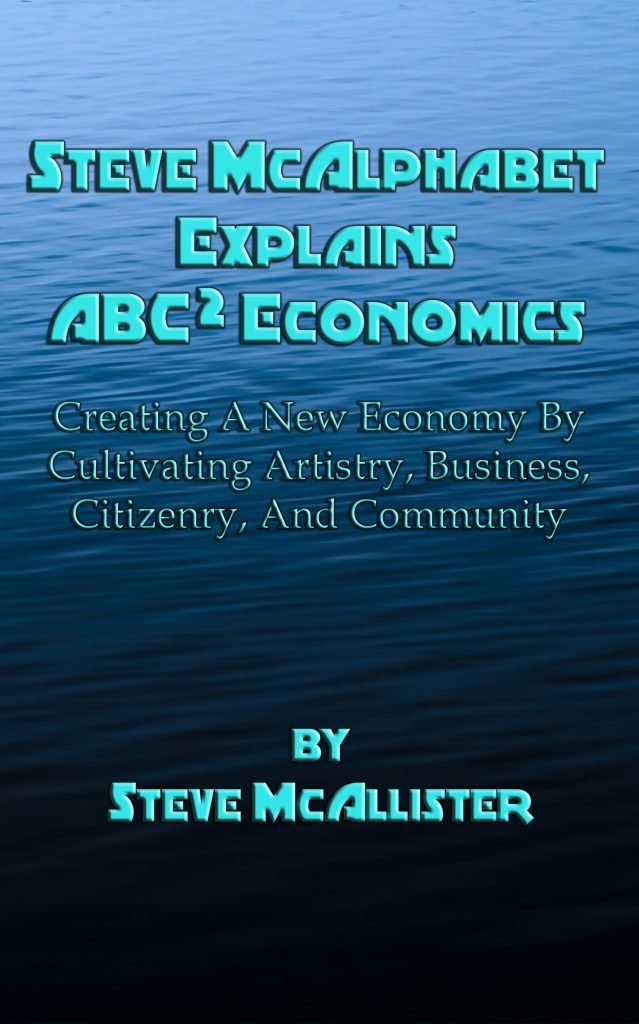Archeological records show that before humankind developed the Market Economy, our species lived a more egalitarian lifestyle where everything was shared. Living as nomads, early human tribes lived as one people rather than a group of individuals. Even in more modern primitive cultures, hoarding resources (so common in our society) is seen as a mental illness, and those afflicted with the inability to share are banished from the village.
Egalitarianism had a number of benefits in tribal society. Sharing with others ensured reciprocity when another tribe member found food or other resources. It relieved them of the burden of caring for and transporting surplus. And it provided them with the joy that comes from investing in others. Rather than accumulating material goods, they accumulated trust, appreciation, support, and love.
“Nonaccumulation models hunter-gatherer societies,” says Charles Eisenstein in Sacred Economics, “in which there was great abundance but no accumulation, and in which prestige went to those who gave the most. To give the most, one also had to receive the most, either from nature or from other people. The great hunter, the skilled artist or musician, the energetic, the healthy, and the lucky would have more to give. In any event, this kind of prestige is to the benefit of all. It is only when high income translates into accumulation, frivolous consumption, or socially destructive consumption that it makes sense to restrict it. In other words, the problem is not with high income; it is with the results of the income getting stuck at some point in its circulation, accumulating and stagnating.”
After all that humanity has been through, the Wisdom Revolution offers us the opportunity to embrace the entirety of our history, recognizing that both the individual and the whole of the planet is worthy to be cared for, and we’re graced with the ability, through our own industriousness and the Provider of the lives we get to be industrious with, to share in the abundance beyond the limitations of the Market Economy.
“The sharing economy is also growing,” says Kate Raworth in Doughnut Economics, “in which the culture of ownership – with every household equipped with its own washing machine and car is giving way to a culture of access, with households sharing laundry facilities and renting cars by the hour from a local car club. Rather than go shopping for new clothes, books and children’s toys, a growing number of people are swapping – or ‘swishing’ – them with friends and neighbors. In such an economy, plenty of economic value will still be generated through the products and services that people enjoy, but far less of that total value will flow through market transactions.”
The rise of the sharing economy has certainly made an impact in the Market Economy. It has completely disrupted the “old school” methods of capitalism, providing a number of paradoxical situations. For instance, Uber, the largest provider of transportation, owns no vehicles; AirBnB, the largest provider of temporary shelter, owns no residential property; YouTube, the largest distributor of video content, produces no content; Facebook, the largest provider of news, does no journalism; et cetera. Yet, it is also being seen as people use the technology at our disposal to not only share in the Market Economy, but also to simply share.
A number of websites have emerged, allowing people to share a variety of goods and services, not for monetary compensation, but just to spread the wealth that the wealthy haven’t absorbed yet. For instance, couchsurfing.com connects people who need a couch to sleep on with people who want to have guests sleep on their couch; freecycle.com helps people with stuff to get rid of get in touch with people that want it… not for currency, just to keep materials in use and out of the landfill; and nearly every city in the civilized world has a few Facebook groups devoted to sharing goods and services… for free.
Complementary currencies like time-banking have also taken hold in a variety of communities, where people use their time as currency, allowing them to better invest in and realize the value of the Core Economy. With an online time bank, time-bankers can post services they offer and services they need, connecting with others in the community who need or want to offer help. However, many time-bankers, although they have the technology to track the number of hours given to another, don’t bother logging them. Instead, they merely embrace the Gift Economy and allow the purpose they feel through service be its own reward.
The sharing economy, using technology to empower people to offer their goods and services in the Market Economy, is one thing, but the Gift Economy is its own entity. Even beyond the support offered through the Core Economy, the Gift Economy extends not only to those near and dear to us, those with whom we regularly create community, but to the rest of the world as well. The Gift Economy empowers people to fully realize freedom with the ability to give freely, releasing the fear and need for control that the Market Economy requires.
“The technological direction of this revolution is at odds with its social direction,” writes Paul Mason in Postcapitalism: A Guide To Our Future. “Technologically, we are headed for zero price goods, unmeasurable work, an exponential takeoff in productivity and the extensive automation of physical processes. Socially, we are trapped in a world of monopolies, inefficiency, the ruins of a finance-dominated free market and a proliferation of ‘bullshit jobs’. Today, the main contradiction in modern capitalism is between the possibility of free, abundant socially produced goods, and a system of monopolies, banks and governments struggling to maintain control over power and information. That is, everything is pervaded by a fight between network and hierarchy.”
Human civilization has largely operated through hierarchies in the roughly 10,000 years since we invented money and the Market Economy. Although the population has served at the behest of kings, queens, emperors, sultans, dictators, presidents, councils, republics, and the ministers who have been given the power of punishment, there has also been a constant yearning to have more freedom from the rule of others and to develop a stronger sense of equality and interdependence through a more democratic network of relationships. And although the founders of the American experiment dreamed of creating a democracy, only with the technological developments of the last few decades have we had a glimmer of how an actual democracy could work.
As we redevelop what we know as the “economy”, we would be wise to recognize the economic needs we have beyond the Market Economy. After a century of advertisements and marketing propaganda, our minds have been filled with manufactured desires and cravings, but what do we really need to live happy, fulfilling lives? While the tunnel vision of capitalism has had so many of us driven toward the individual acquisition of material goods and selfishness at all costs, those who can see beyond the trappings of personal vanity realize that human needs are more complex than mere ego cultivation.
“People don’t need enormous cars,” writes Donella H. Meadows in The Limits to Growth: The 30-Year Update, “they need admiration and respect. They don’t need a constant stream of new clothes; they need to feel that others consider them to be attractive, and they need excitement and variety and beauty. People don’t need electronic entertainment; they need something interesting to occupy their minds and emotions. And so forth. Trying to fill real but nonmaterial needs-for identity, community, self-esteem, challenge, love, joy-with material things is to set up an unquenchable appetite for false solutions to never-satisfied longings. A society that allows itself to admit and articulate its nonmaterial human needs, and to find nonmaterial ways to satisfy them, would require much lower material and energy throughputs and would provide much higher levels of human fulfillment.”
In order to create the world we want, we are going to have to think bigger than the world view we’ve accepted over the last several millennia. While our Artistry and Business can easily be accounted for in the Market Economy as buyer and seller, to develop a more balanced economy, we must also realize and appreciate the value the Core Economy contributes toward our Citizenry and Community by investing in the Planetary Economy and making the Gift Economy possible.
“The generosity of the Earth allows us to feed all mankind,” E.F. Schumacher reminds us in A Guide for the Perplexed, “we know enough about ecology to keep the Earth a healthy place; there is enough room on the Earth, and there are enough materials, so that everybody can have adequate shelter; we are quite competent enough to produce sufficient supplies of necessities so that no one need live in misery.”
This is the goal of ABC2 Economics.

This is an excerpt from the book Steve McAlphabet Explains ABC Squared Economics. Go to https://stevemc.xyz/books/steve-mcalphabet-explains-abc-squared-economics/ to find out more.


